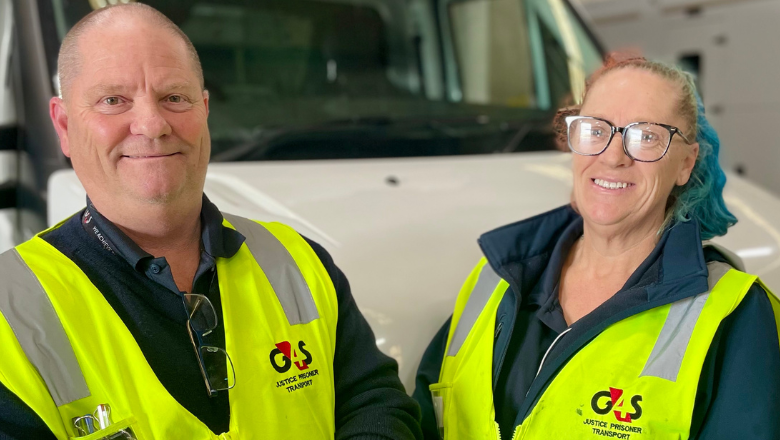From Gardening and Management to Prisoner Transport

When did you start with G4S as Prisoner Transport Officers, and what were you doing beforehand?
Chyvonne: I've been a Prisoner Transport Officer with G4S for almost two years now. Before this, I worked as a maintenance gardener at a retirement village for nine years. While it was a fulfilling job, I wanted to do something that felt like I was making a bigger contribution to society. I stumbled upon an ad for a Prisoner Transport Officer position and decided to give it a shot. I've never looked back!
Gary: I joined G4S in 2015 after a 25-year career in management in the supermarket and transport industries. I was seeking a change of pace and better work-life balance, and this job has definitely provided that, I’m able to switch off after my workday is done and don’t get calls outside of hours which is great!
Could you walk us through a typical day or shift as a Prisoner Transport Officer? What are some of the main tasks and responsibilities you handle?
Gary: Every day is different. We might pick someone up from a police station and take them to court, or we might transfer someone between prisons. The distances we travel vary greatly. Sometimes it's just a short drive, and other times it's a four-hour journey. It's always interesting and keeps us on our toes.
Chyvonne: I would agree with Gary that no two days are the same, however I usually start by picking up individuals from police stations or courts and then transport them to their designated destinations. This could be a short drive or a several-hour journey. We always work in pairs, which makes the long drives more manageable as we switch around the driving duties. Before transporting someone, we also carefully review the individual's information to ensure their safety and wellbeing during the journey.
What would you say is the most rewarding aspect of your role?
Chyvonne: The human connection is incredibly rewarding, in my last job I worked alone and it makes a huge difference to have that human connection. I enjoy communicating with the individuals I transport and hearing their stories. It's also gratifying to offer support and compassion to those going through tough times.
Gary: I agree. I like connecting with the people I work with and those we transport. It's always a good feeling when someone thanks you for your help. It can be really impactful to talk to someone who's going through a hard time and make them feel a little bit better.
What are the challenges of the role, and what do you consider to be the most important qualities or abilities for someone to overcome the challenges?
Gary: This job can be challenging as we often deal with unpredictable individuals who have recently been under the influence. You need to be able to communicate effectively with your colleagues, with the individuals you're transporting, and with other agencies. Honesty and respect go a long way in building trust with the person you’re transporting as well.
Chyvonne: To reinforce Gary’s point, another challenge is dealing with highly emotional people that you’re transporting, so you need to be respectful of them and yourself. It's also important to remain calm, professional, compassionate, and resilient.
Safety is paramount in Prisoner Transport. Can you describe some of the procedures or protocols G4S has in place to ensure the safety of both officers and the individuals being transported?
Gary: G4S takes safety very seriously. We have strict protocols in place, including video surveillance, and well-defined processes for handling emergencies.
Chyvonne: We also have constant communication with our control room who provide dedicated support and guidance, plus we have a comprehensive training program before commencement with a huge focus on safety.
I understand that both of you are mentors to new Officers during their on-the-job training period - what is it like to be a mentor to new officers?
Gary: I enjoy being a mentor a lot, I enjoyed it a lot during my management days and I still enjoy it now. The new starters are hungry for knowledge and very willing to learn, so it’s a pleasure to mentor them.
Chyvonne: I find being a mentor rewarding. It's a chance to share my knowledge and experience with others. Plus, I’ve actually grown in my role as you’re forced to step up as a more experienced Officer while you’re a mentor, so it has been great for my career development too.
